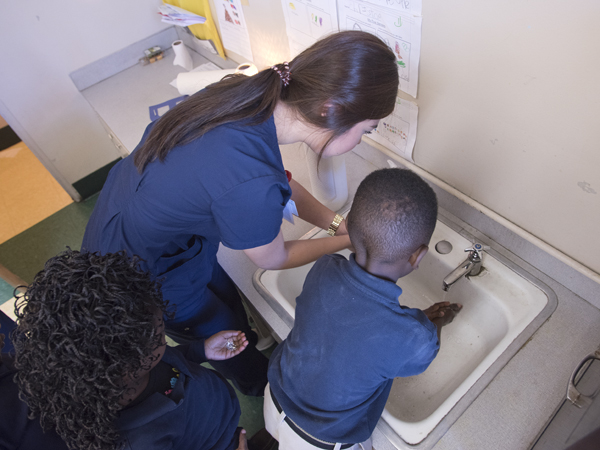Students teach students the importance of hand hygiene

Published in News Stories on October 29, 2015
To the tune of Frère Jacques, kindergarten students at French Elementary in Jackson sing, “Top and bottom, top and bottom, in between, in between, rub them all together, rub them all together, squeaky clean, squeaky clean!”
The kindergartners sit in neat rows on the carpet as University of Mississippi Medical Center School of Nursing students Meagan Coleman, Brittany Stamper and Shairah Hortelano sing through the verses, while demonstrating hand motions. After only once or twice through the song, the kids are singing along, word for word.
The future nurses are taking part in the Mississippi Kindergarten Hand Washing Campaign to incorporate a service learning aspect of the N300 Health Promotion Course. The campaign is a partnership between the Mississippi State Department of Health, Mississippi Department of Education, Mississippi Nurses Foundation and the Mississippi Hospital Association's Association for Professionals in Infection Control and Epidemiology (APIC) Greater Jackson Chapter.
Katie Hall, instructor of nursing, teaches the junior level course.
“The class is about primary prevention, preventing a person from getting an illness or disease,” said Hall. “With flu season here, we are about to see a lot of respiratory illness - runny noses and coughs. If we can teach the kids to wash their hands and cough in their arms, then we may prevent them from coming in sick to the hospital.”

Nursing students Meagan Coleman, left, and Shairah Hortelano quiz students at French Elementary in Jackson on hand hygiene knowledge.
One could even say the effort is also about improving education in Mississippi. The state has a 15 percent rate of chronic absenteeism, according to Mississippi Kids Count, a Jackson research organization. And, according to research reported by Attendance Works, the number of days a child misses in kindergarten and pre-k, including excused absences for illness, can predict a child's ability to read at grade level in the third grade.
On its website, the Centers for Disease Control calls hand washing the “do-it-yourself vaccine” and “one of the best ways to remove germs, avoid getting sick, and prevent the spread of germs to others.” Dr. Nykiconia Preacely is the career epidemiology field officer in the Office of Public Health Preparedness and Response for the Centers for Disease Control and Prevention at the Mississippi State Department of Health and is the project lead for the Mississippi Kindergarten Hand Washing Campaign.
Preacely said the program began in 2013 and has reached approximately 12,500 kindergarten and pre-k students statewide since its inception.
“The program began by cultivating future health-care professionals - high school health science students - to serve as champions in their communities by teaching younger students proper hand hygiene,” said Preacely.

School of Nursing student Shairah Hortelano shows a French Elementary student how to wash her hands using soap and water.
The program was well-received and met with so much demand that it has been expanded to include Mississippi's college-level schools of nursing. UMMC's School of Nursing is participating for the first time this year and is focused on kindergarten classes in 13 schools in the Jackson Public School District. The nursing students have taught a total of 768 kids this year.
Back at French Elementary, the students quietly listen to a story about Jeremy the Germ and the Germinators, read by Hortelano. When Jeremy threatens to make the story characters ill, the Germinators defeat him with their “dangerous weapons: soap and water.”
The storybook is the first of four lessons taught over the course of an hour. After Hortelano reads, she pours glitter into the hands of four kindergartners. The glitter represents germs. Two of the students wash away the glitter with just water and two with soap and water to demonstrate how much more effectively soap washes away germs.

A French Elementary kindergarten student washes soap from her hands as the rest of her class sings the hand-washing song.
Coleman demonstrates lesson three with a faux sneeze - a spray bottle filled with water. She shows how sneezing in your hand and then shaking a friend's hand spreads germs to those nearby. A chorus of “ewww!” arises from the carpet as the students make the connection between the dampness on their hands and a germ-filled sneeze. The children are then instructed to use the bend of their elbows to catch a sneeze or a cough.
With lesson four, Coleman tosses a sticker-covered beach ball to each child in the class. The catcher removes a sticker and places it on his shirt. Once everyone has a sticker, Coleman breaks the news that the stickers represent germs that can be passed along by sharing toys. She explains that this is why frequent hand washing is important for good health.
At about the hour mark, the 5-year-olds' attention spans are waning. The SON students wrap up by repeating the short quiz they opened with, designed to judge the student's health knowledge before and after the lesson.
For the SON students, the experience is an effective way to learn about health promotion, a responsibility they will inherit upon graduation.
Hortelano says that being in the kindergarten classroom teaching students provides more experience than sitting in a lecture. “It's different when you are in class and they teach you how to promote safety and health than when you're actually in the community doing it yourself.”
“I think it's a great opportunity for the young children to see adults who are in college,” said Stamper. “Maybe we can be a light to them and encourage them indirectly.”


